Research on the relationship between breakfast and brain activity Joint research by Ryuta Kawashima, Professor, Tohoku University and Otsuka Pharmaceutical Saga Nutraceuticals Research Institute
In the experiment where changes in body temperature, feelings of fatigue, and ability to perform mental tasks resulting from consuming different types of meals were investigated, it was found that breakfast is crucial for effective functioning of the brain and body, with different types of meals affecting the body in different ways.
What factors cause these changes? Is it the nutritional balance of the meals?
To answer these questions, Otsuka Pharmaceutical conducted a joint research project with Dr. Ryuta Kawashima of Tohoku University's Institute of Development, Aging and Cancer, on the effect of breakfast quality on cognitive function.
Using fMRI to measure the relationship between different types of breakfast and brain function
Three types of beverage were prepared as alternatives to a breakfast meal, in order to investigate the relationship between breakfasts with different nutritional values and brain function. Mental tasks such as doing mental arithmetic and taking simple memory tests were performed four times: before breakfast and 30, 90, and 180 minutes after breakfast. Brain function was measured at those times using fMRI*. The study subjects were six healthy university students who usually eat breakfast.
A method using magnetic resonance imaging (MRI) to indirectly measure changes in neuronal metabolism and blood flow associated with brain activity.
Study outline
| Objective | To neuroscientifically test the relationship between the nutritional value of breakfast and brain function. |
|---|---|
| Subjects | Six healthy adult men and women with no habit of skipping breakfast Age: 21 (20-22) |
| Study design | Unblinded crossover study (random allocation)*
|
| Test articles | Each subject took the following three types of beverages with at least one week between tests.
 |
Time schedule and measured items
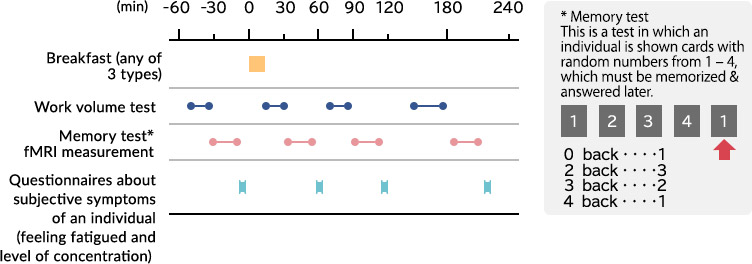
Changes in feeling of fatigue and level of concentration
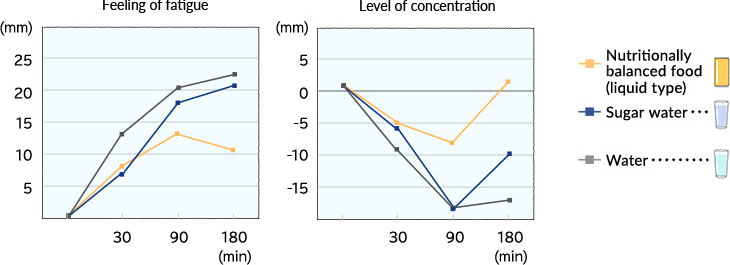
Brain activity increased after drinking nutritionally balanced food (liquid type)
The highlighted part of the illustration below shows the internal surface of the prefrontal cortex*. The graph on the right shows the difference in the prefrontal cortex activity after eating different breakfasts.
This clearly shows higher activity along the internal surface of the prefrontal cortex when the nutritionally balanced liquid food had been drunk compared to when the sugar solution or water was consumed.
- *The prefrontal cortex is an area of the brain involved in active attention, intention, and ambition. Drops in activity in this area are said to be related to chronic fatigue.
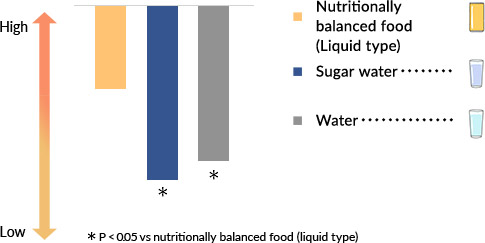
fMRI data
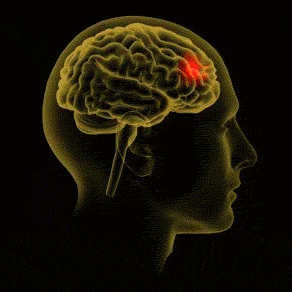
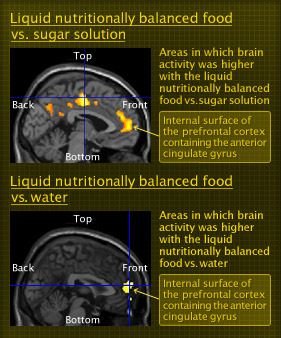
The study results confirmed that brain activity along the internal surface of the prefrontal cortex is higher when a liquid nutritionally balanced food containing a proper balance of the five major nutrients is drunk than when only sugar is taken.
While it was well known that sugar is important for improving brain function, this study has
demonstrated neuroscientifically that it is more beneficial to have a nutritionally balanced meal.
Dr. Kawashima engages in research into functional brain imaging and functional brain development. He is also enthusiastically involved in social endeavors such as educating the public about brain science and launching joint projects between academia and industry aimed at helping older people maintain and improve brain function.
Brief career history
- 1985
- Graduated from Tohoku University School of Medicine
- 1989
- Graduated from Tohoku University Graduate School of Medicine (Doctor of Medicine)
- 1991
- Guest researcher at the Karolinska Institute in Sweden
- 1993
- Assistant at the Institute of Development, Aging and Cancer, Tohoku University
- 1998
- Instructor at the same institute
- 2001
- Professor at the New Industry Creation Hatchery Center, Tohoku University
- 2006
- Professor in the Department of Functional Brain Imaging at the Institute of Development, Aging and Cancer, Tohoku University
- 2008
- Also professor in the Division of Developmental Cognitive Neuroscience at the same institute
- 2008-2011
- Tohoku University Distinguished Professor
- 2009
- Director, Smart Ageing International Research Center, Tohoku University
- 2014
- Director, Institute of Development, Aging and Cancer, Tohoku University
- 2016
- Executive Director, Smart-Aging Research Center (S.A.R.C.)
- Books
- Dr. Kawashima is the author of numerous books including Train Your Brain: 60 Days to a Better Brain.






